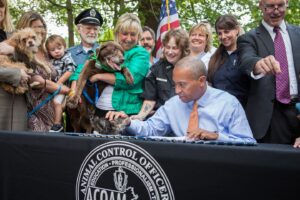-
Adopt
-
Veterinary Care
Services
Client Information
- What to Expect – Angell Boston
- Client Rights and Responsibilities
- Payments / Financial Assistance
- Pharmacy
- Client Policies
- Our Doctors
- Grief Support / Counseling
- Directions and Parking
- Helpful “How-to” Pet Care
Online Payments
Referrals
- Referral Forms/Contact
- Direct Connect
- Referring Veterinarian Portal
- Clinical Articles
- Partners in Care Newsletter
CE, Internships & Alumni Info
CE Seminar Schedule
Emergency: Boston
Emergency: Waltham
Poison Control Hotline
-
Programs & Resources
- Careers
-
Donate Now
This law creates a statewide spay/neuter program and adds enforcement provisions to the spay/neuter deposit law for animals adopted from shelters. It requires animal control officers to receive training for the complicated work they do to keep the people and animals in their community safe. The law also creates statewide oversight for animal control, categories for kennel licensing, and consistency in the holding time for stray dogs. It provides other meaningful updates to the state’s antiquated animal control laws, including restrictions on tethering dogs and the prohibition of carbon monoxide and carbon dioxide gas as a means to “euthanize” dogs and cats. It will reduce dog bites by improving the dangerous dog law in a breed-neutral manner and allow pets to be included in domestic violence protection orders to protect both animals and people. Because it is funded by a voluntary tax check off, the new law will not cost money — it will actually minimize costs to municipalities by reducing the number of homeless animals and the associated cost to house and take care of them. This law took effect October 31, 2012.
S. 2192, An Act Further Regulating Municipal Animal Control
Signed by the Governor on August 2, 2012. The law took effect 90 days after it was signed, Oct. 31, 2012.
Summary of the new law:
- Reduces the number of homeless animals in the Commonwealth through a statewide spay/neuter program and will, in turn, also reduce the cost to cities and towns for housing and sheltering these animals. This is funded by a voluntary tax check off.
- Adds enforcement provisions to section 139A (the spay/neuter deposit law for animals adopted from shelters and animal control facilities) to ensure these animals can’t reproduce.
- Requires Animal Control Officers to receive training. People are often surprised to learn that their local animal control officer is not required to receive training for the complicated work they do to keep the people and animals in their community safe. This is funded by the tax check off.
- Prohibits carbon monoxide and carbon dioxide gas as a means to “euthanize” dogs and cats.
- Reduces dog bites by improving the dangerous dog law in a breed-neutral manner.
- Allows pets to be included in domestic violence protection orders to protect both animals and people.
The law creates some statewide oversight for animal control, which previously did not exist in Massachusetts; creates categories for kennel licensing; creates consistency in the holding time for stray dogs; and provides other meaningful updates to the state’s antiquated animal control laws. A House amendment added some restrictions on the tethering of dogs (Ch 140 sec. 174E).
Why were these changes needed?
Many of the laws that govern animal control date back to the 1800s. Quite simply, the laws did not address the current state of animal control in our municipalities, which are no longer based on the county system. The fines are outdated, as is the term “dog officer”; “animal control officer” more accurately describes the role fulfilled. These proposed changes were made to Chapter 140, sections 136A through 174D to update and make the animal control laws more efficient, current, and effective. They will also save cities and towns money. At the beginning of every legislative session, many bills are filed to address a section or issue relating to animal control. For years, organizations, individuals, and legislators have been seeking a more comprehensive revision; this law is the result of stakeholder meetings since 2005 to rework the sections in Chapter 140 relating to animals.
The Animal Control Officers Association of Massachusetts (ACOAM), the Massachusetts Society for the Prevention of Cruelty to Animals (MSPCA), the Animal Rescue League of Boston, the state’s Bureau of Animal Health within the Department of Agricultural Resources, and the Massachusetts Veterinary Medical Association (MVMA) worked together to draft these changes.
Co-sponsors:
| Rep. Coakley-Rivera Rep. Benson Rep. Atkins Sen. Brownsberger Rep. Andrews Rep. Ashe Rep. Ayers Rep. Balser Rep. Brady Rep. Toomey Rep. Hecht |
Rep. Cabral Rep. Canavan Sen. DiDomenico Rep. Dwyer Sen. Eldridge Rep. Fresolo Rep. Garballey Rep. Gobi Rep. Harrington Rep. Sullivan |
Sen. Hedlund Rep. Lewis Rep. Linsky Sen. Montingy Rep. Peisch Sen. Rush Rep. Sciortino Rep. Speranzo Sen. Spilka Rep. Story |
Sponsor: Senator Jehlen
- Photos from the bill signing at Dog Breath Photography.
- News reports on passage and signing:
- — West Roxbury Patch, Gov. Signs New Animal Welfare Law Creating Statewide Homeless Animal Fund, Aug. 3
- — Metrowest Daily News, Patrick Signs Animal Control Reform Bill in Ashland, Aug. 3
- — The Sun Chronicle, Dog’s Day with Signing of Bill, Aug. 3
- Read the law
- Read the MSPCA’s summary/testimony on select provisions.
- Read Senator Jehlen’s press release upon Senate passage.




